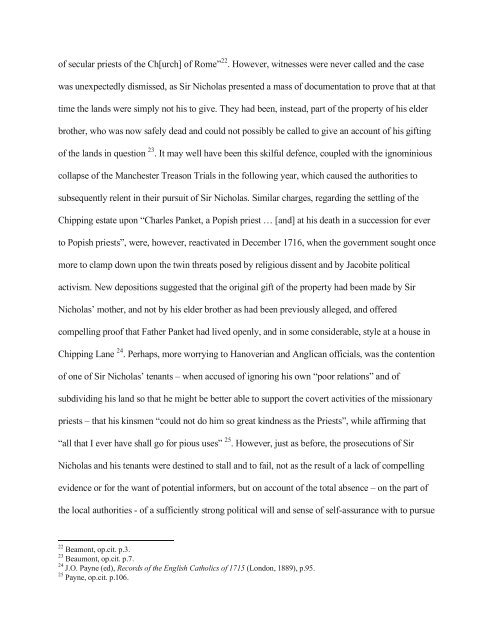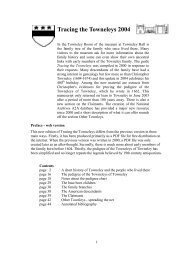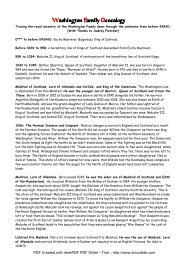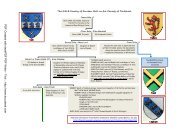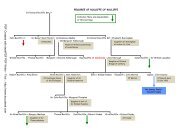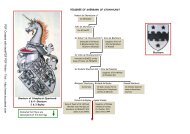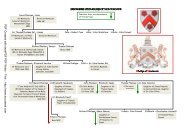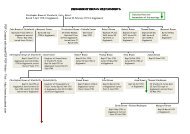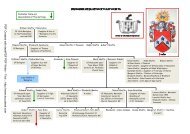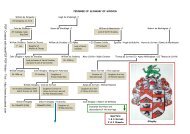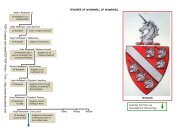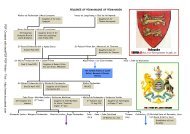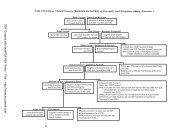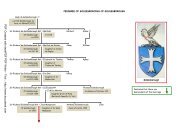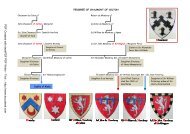SHIRBURNS of Stoneyhurst.pdf - Ingilby History
SHIRBURNS of Stoneyhurst.pdf - Ingilby History
SHIRBURNS of Stoneyhurst.pdf - Ingilby History
You also want an ePaper? Increase the reach of your titles
YUMPU automatically turns print PDFs into web optimized ePapers that Google loves.
<strong>of</strong> secular priests <strong>of</strong> the Ch[urch] <strong>of</strong> Rome” 22 . However, witnesses were never called and the case<br />
was unexpectedly dismissed, as Sir Nicholas presented a mass <strong>of</strong> documentation to prove that at that<br />
time the lands were simply not his to give. They had been, instead, part <strong>of</strong> the property <strong>of</strong> his elder<br />
brother, who was now safely dead and could not possibly be called to give an account <strong>of</strong> his gifting<br />
<strong>of</strong> the lands in question 23 . It may well have been this skilful defence, coupled with the ignominious<br />
collapse <strong>of</strong> the Manchester Treason Trials in the following year, which caused the authorities to<br />
subsequently relent in their pursuit <strong>of</strong> Sir Nicholas. Similar charges, regarding the settling <strong>of</strong> the<br />
Chipping estate upon “Charles Panket, a Popish priest … [and] at his death in a succession for ever<br />
to Popish priests”, were, however, reactivated in December 1716, when the government sought once<br />
more to clamp down upon the twin threats posed by religious dissent and by Jacobite political<br />
activism. New depositions suggested that the original gift <strong>of</strong> the property had been made by Sir<br />
Nicholas’ mother, and not by his elder brother as had been previously alleged, and <strong>of</strong>fered<br />
compelling pro<strong>of</strong> that Father Panket had lived openly, and in some considerable, style at a house in<br />
Chipping Lane 24 . Perhaps, more worrying to Hanoverian and Anglican <strong>of</strong>ficials, was the contention<br />
<strong>of</strong> one <strong>of</strong> Sir Nicholas’ tenants – when accused <strong>of</strong> ignoring his own “poor relations” and <strong>of</strong><br />
subdividing his land so that he might be better able to support the covert activities <strong>of</strong> the missionary<br />
priests – that his kinsmen “could not do him so great kindness as the Priests”, while affirming that<br />
“all that I ever have shall go for pious uses” 25 . However, just as before, the prosecutions <strong>of</strong> Sir<br />
Nicholas and his tenants were destined to stall and to fail, not as the result <strong>of</strong> a lack <strong>of</strong> compelling<br />
evidence or for the want <strong>of</strong> potential informers, but on account <strong>of</strong> the total absence – on the part <strong>of</strong><br />
the local authorities - <strong>of</strong> a sufficiently strong political will and sense <strong>of</strong> self-assurance with to pursue<br />
22 Beamont, op.cit. p.3.<br />
23 Beaumont, op.cit. p.7.<br />
24 J.O. Payne (ed), Records <strong>of</strong> the English Catholics <strong>of</strong> 1715 (London, 1889), p.95.<br />
25 Payne, op.cit. p.106.


